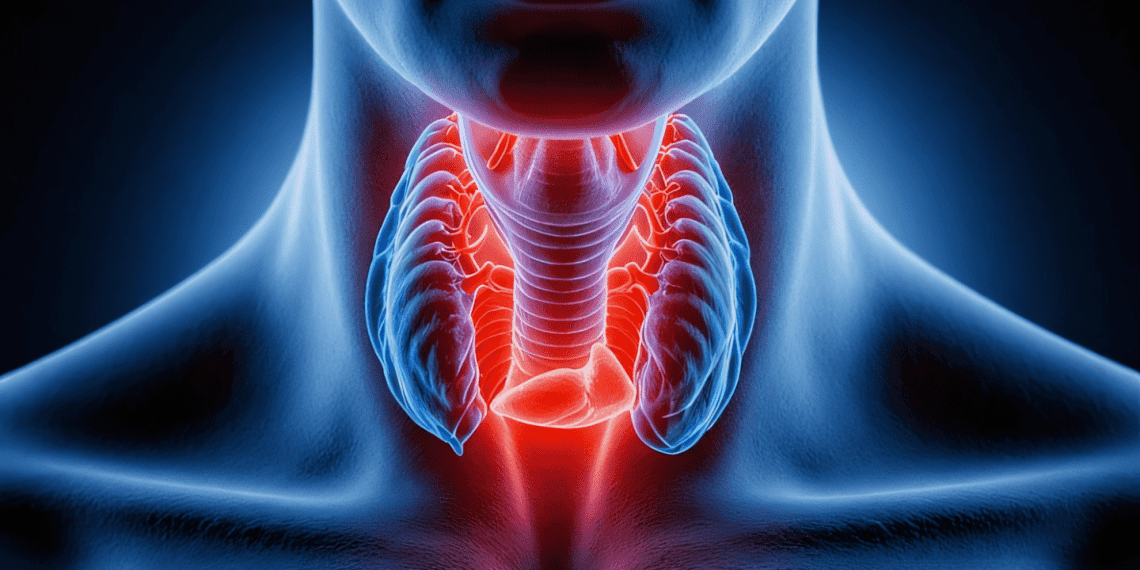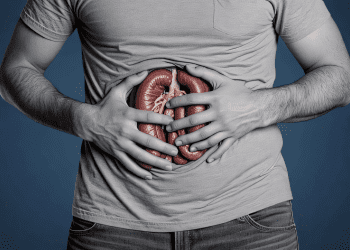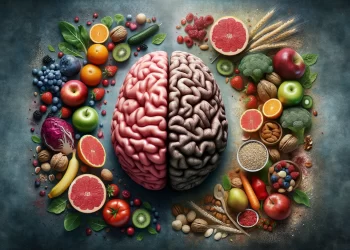If you’ve been feeling off—like you’re gaining weight, always tired, or just not yourself—it might be your thyroid. A lot of people don’t realize how important their thyroid is to keep everything in balance. From your energy levels to your mood, your thyroid controls so many essential functions in the body. And a lot of things you’re eating could actually be damaging it.
Here’s what you need to know to fix low thyroid function naturally— and what signs to look out for before it gets worse.
If you’re not in the mood to read, no worries at all! You can simply kick back and listen to the article in the video clip below. It’s a great way to absorb the information while you relax!
Understanding the Thyroid’s Role
The thyroid is a small gland located in the front of your neck, just below the Adam’s apple. Even though it’s small, it plays a huge role in our body. Basically, this gland helps control your metabolism, how fast your body burns calories, and even how well your brain functions.
Think of the thyroid as the conductor of an orchestra, where it tells every system—your heart, liver, brain—they’re on stage next. If your thyroid isn’t up to speed, nothing in your body quite works the way it should. You might feel sluggish, gain unexpected weight, or experience brain fog.
Common Thyroid Disorders
Hypothyroidism
Hypothyroidism is when your thyroid isn’t producing enough hormones. That means everything in your body slows down—your metabolism, your digestion, and even your mood.
Key symptoms of hypothyroidism include:
- Weight gain, especially around the abdomen
- Dry skin
- Hair loss (including thinning eyebrows)
- Constant fatigue
- Joint pain
- Depression or mood swings
People often get frustrated, thinking, “I’m eating right, why am I gaining weight?” Well, your body isn’t metabolizing the food fast enough due to the lack of thyroid hormones.

Hyperthyroidism
On the flip side, hyperthyroidism is when your thyroid is on overdrive. Instead of feeling sluggish, everything speeds up. You might lose weight quickly, get heart palpitations, or feel jumpy and anxious.
Key signs of hyperthyroidism include:
- Rapid weight loss
- Fast heartbeat
- Anxiety or restlessness
- Increased sweating
- Bulging eyes
Although hyperthyroidism seems like the opposite of low thyroid function, a lot of people swing between the two when their thyroid is inflamed.
Autoimmune Conditions: Hashimoto’s and Graves’ Disease
Two common autoimmune disorders related to the thyroid are Hashimoto’s thyroiditis and Graves’ disease. In both these cases, your own immune system attacks your thyroid but in different ways.
- Hashimoto’s usually leads to low thyroid function (hypothyroidism).
- Graves’ disease usually causes an overactive thyroid (hyperthyroidism).
It’s easy to get frustrated when dealing with either of these conditions because even though they seem different, the root problem is the same—an inflamed thyroid.

Symptoms of Thyroid Problems
So, how do you know if your thyroid is causing all these problems? Here’s a list of the 10 common symptoms:
- Unexplained weight gain or loss: If you’ve put on weight (despite eating right) or dropping pounds rapidly, your thyroid could be the culprit.
- Brain fog: Feeling mentally cloudy? When your brain doesn’t get the right hormones, cognitive function slows.
- Fatigue: It’s not just regular tiredness. Hypothyroidism can make you feel like you’ve hit a brick wall.
- Hair thinning: Particularly the outer third of your eyebrows and even patches of your scalp. It’s a tell-tale sign.
- Cold intolerance: If you’re always freezing, but everyone else feels fine, that’s your thyroid slowing everything down.
- Memory issues: Forgetting names or appointments a lot? That could be due to low T3 levels, a thyroid hormone essential for brain function.
- Constipation: Slow digestion, especially constipation, is common with an underactive thyroid.
- Elevated cholesterol: If your thyroid isn’t working well, your body can’t break down fats properly, which spikes cholesterol.
- Slow heart rate: Your heart needs thyroid hormones to keep its rhythm. A slow heart rate can be due to low thyroid function.
- Puffy, dry skin: Slow metabolism means moisture and nutrients don’t get to the skin. You might notice dull, dry patches or swelling around the eyes and face.
Factors Affecting Thyroid Health
Dietary Influences
When it comes to food, there are several common foods that mess with your thyroid. Foods you thought were healthy might actually be holding your thyroid back from performing its best.
- Broccoli, kale, and cabbage: These veggies come from the Brassica family and can inhibit iodine absorption. Broccoli might seem innocent, but it’s notorious for blocking iodine, which your thyroid desperately needs.
- Flax seeds, soy, and oats: Similar to broccoli, these commonly quoted “healthy” foods can prevent iodine from doing its job. Again, these foods might look great on paper, but they’re not helping your thyroid out.

Environmental Factors: Fluoride and Toxins
Fluoride is another huge problem. Whether it’s in your water or even your toothpaste, fluoride interferes with how your body absorbs iodine. Over the last few decades, pollution has also been a significant contributor to iodine deficiency. This is why more people than ever are experiencing thyroid issues today—they’re just living in a toxic environment.
Lifestyle Factors: Stimulants and Stress
Many stimulants we rely on—like coffee, tea, or energy drinks—can hammer away at your thyroid, especially if you’re already low on energy. While these give us a temporary shift, the long-term effects aren’t so great for thyroid health.
The Role of Iodine in Fixing Low Thyroid
Let’s talk about iodine because this is super important. If your thyroid is struggling, it’s time to ask yourself if you’re getting enough iodine. Iodine is a halogen, vital to the production of thyroid hormones like T3 and T4.
You may have been told to stay away from it, but that’s outdated advice. Most people today need more iodine, thanks to pollutants like fluoride and chlorine, which block iodine absorption.
- How much iodine should you take? This depends. A couple of decades ago, only two drops of Lugol’s iodine solution would be enough to fix a deficiency. Now, with increased environmental toxins, it’s often recommended to take four to six drops of Lugol’s 5% solution daily.
Salt Loading: Along with iodine, you’ll want to perform something called “salt loading” to rid your body of all the junk that blocks iodine from getting where it needs to go. This involves taking a half-teaspoon of salt followed by a glass of water every day to flush out halides like fluoride.
The High-Fat Carnivore Diet to Fix Low Thyroid
Now, the best way I found to really heal the thyroid is through a high-fat carnivore diet. The idea here is to focus on nutrient-dense animal fats that are anti-inflammatory and help your body heal properly.
Here’s why a high-fat diet works:
- Fat doesn’t become glucose: If you’re eating tons of protein in hopes of healing, that protein can eventually turn into glucose, spiking insulin and keeping your thyroid in a sluggish state. Fat doesn’t do this—it helps lower inflammation and gives your body what it needs to repair.
- Hormone production: Cholesterol from fats helps your body produce vital hormones, including those produced by the thyroid. If you’re on a low-fat diet, your thyroid doesn’t stand a chance to recover because it doesn’t have the raw materials it needs.
What does this look like?
If you’re wondering what high-fat carnivore meals should look like, the simplest suggestion is around 80% fat to 20% protein. For example, a solid serving of a fatty ribeye steak with a large side of butter should do the trick.
The more your thyroid is struggling, the higher your fat intake should be. You can dial back the protein and up the fat for a while until you see improvement.

Hormone Replacement Therapy and Testing
Many doctors will automatically prescribe a synthetic hormone replacement like Synthroid (levothyroxine) if you have a thyroid issue. The problem is that Synthroid only provides T4, an inactive thyroid hormone.
A better option is natural desiccated thyroid (NDT) like Armour Thyroid, which offers a more full-spectrum solution because it contains multiple thyroid hormones (T3, T2, T4). Ask your doctor about switching to a more natural hormone therapy if you’re not seeing improvements with Synthroid.
If you’re testing your thyroid, please advocate for full tests—your Free T3, Free T4, and thyroid antibodies count. Do not rely solely on TSH (thyroid-stimulating hormone). It’s an outdated method.
Reducing Stress and Cortisol’s Impact on Thyroid Function
Stress is another important piece of the puzzle. When your cortisol levels are chronically high (hello, stress!), it can wreak havoc on your thyroid. Over time, this elevated stress hormone burns out the thyroid and slows it down.
One simple way to manage stress is by eating enough—especially enough fat. Fasting can raise cortisol levels too, so keep that to a minimum while you’re actively healing your thyroid.
Additional References for Fixing Low Thyroid
- Thyroid Health and Nutrition
This article discusses the impact of nutrition on thyroid health and offers dietary recommendations.
Thyroid Health: Nutrition and Diet - Understanding Thyroid Disorders
A comprehensive overview of various thyroid disorders, their symptoms, and management strategies.
Understanding Thyroid Disorders - The Role of Iodine in Thyroid Function
This resource explains the importance of iodine in thyroid hormone production and overall thyroid health.
Iodine and Thyroid Health - Stress and Thyroid Function
An exploration of how stress affects thyroid function and tips for managing stress levels.
Stress and Your Thyroid - Dietary Fats and Thyroid Hormones
A scientific review of how dietary fats influence thyroid hormone levels and metabolism.
Dietary Fats and Thyroid Hormones
Final Thoughts on Fixing Low Thyroid
If you’re struggling with low thyroid function, the solution is grounded in what you put in your body. A high-fat carnivore diet, iodine supplementation, and reducing environmental toxins like fluoride can work wonders to heal your thyroid naturally. Start by fixing what’s on your plate, and watch for those 10 common signs that your thyroid needs support.
Most people don’t need an extreme intervention—they just need more real nutrients and less junk.
Frequently Asked Questions (FAQ)
Q1: What are the symptoms of low thyroid function?
A1: Symptoms of low thyroid function include unexplained weight gain, fatigue, brain fog, hair thinning, cold intolerance, and dry skin. If you notice these signs, it may be time to consider strategies for fixing low thyroid issues.
Q2: How can I fix low thyroid naturally?
A2: To fix low thyroid naturally, focus on dietary changes such as adopting a high-fat diet rich in nutrient-dense foods. Additionally, ensure adequate iodine intake and reduce exposure to environmental toxins.
Q3: Is a high-fat diet beneficial for thyroid health?
A3: Yes, a high-fat diet can be beneficial for thyroid health. It provides essential fatty acids that support hormone production and help reduce inflammation, which is crucial for fixing low thyroid function.
Q4: How does iodine affect thyroid function?
A4: Iodine is essential for the production of thyroid hormones like T3 and T4. Ensuring sufficient iodine intake is vital for fixing low thyroid problems, as deficiencies can lead to hypothyroidism.
Q5: Can stress impact my thyroid health?
A5: Yes, chronic stress can negatively affect thyroid function by elevating cortisol levels, which may slow down the thyroid. Managing stress through dietary changes and lifestyle adjustments is important for fixing low thyroid issues effectively.









